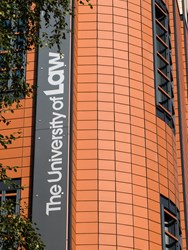Higher Rights of Audience allows you to represent clients as a solicitor-advocate in the Senior civil or criminal courts throughout England and Wales. Having the skills to conduct advocacy in the higher courts is a real advantage to a solicitor’s career; as well as enabling you to provide a complete advocacy service to clients, it can enhance your professional status and increase your earning potential.
Not only are we an acknowledged provider of Higher Rights of Audience Advocacy Assessments, but we also provide the relevant training to help you complete the assessments. If you would like to become a Solicitor-advocate our Higher Rights of Audience training course will help you to prepare for the assessment. Our programme is fully accredited by the SRA, allowing us to provide Dispute Resolution solicitors with the knowledge, skills and qualifications required for practice.
Our Solicitor - Advocate Training Courses
We offer both civil and criminal advocacy training to help prepare you for the Higher Rights Advocacy Assessments. There is no compulsory training required for the HRA Assessments, but we do recommend that you consider our courses to ensure that you are fully prepared for the examinations and that you maximise your performance for the best results.
Whether you wish to take the civil or criminal assessments, we offer two day training sessions for both parts of the HRA Assessment.
- Written Advocacy Training – 2 days
- Practical Advocacy Training – 2 days
Higher Rights of Audience Assessment
We are accredited by the Solicitors Regulation Authority (SRA) to offer civil and criminal Higher Rights Advocacy Assessments under the Higher Rights Regulations. Please note that from 1 April 2021, only qualified solicitors will be permitted to take the assessments. Our Advocacy Assessments cover all aspects of written and practical advocacy, giving you and your employer the confidence that you are fully prepared to represent clients and the profession.
The Advocacy Assessment is run in two parts to make it more manageable for candidates and thus to maximise their performance. Like the HRA training that we provide, the assessments are split into two parts: a written examination and a practical assessment. The written examination accounts for 40% of the total mark, and the practical assessment accounts for 60% of the total marks available. You must achieve a minimum of 60% in each of the two parts to pass the Advocacy Assessment.
Please note that ‘interim’ results i.e. the results of one part of the Advocacy Assessment before the second part has been undertaken, are not released. In all other circumstances, results are only collated, moderated as necessary, and released after both parts of the Advocacy Assessment have been undertaken. Please also note that, as a matter of policy, the University does not release the details of marks.
Please be aware that the University of Law’s Higher Rights Assessment Regulations apply to the undertaking of all Higher Rights assessments. Please also note that final results are released approximately 10 weeks after the second part of the Advocacy Assessment has been undertaken. This timing is necessitated by the SRA to allow their appointed External Examiner to review all assessment results before they are released and is common to all providers of Higher Rights’ Advocacy Assessments.
Part 1
Written Examination
This written exam focuses on evidence, ethics, particular advocacy issues, and equality and diversity. It is tailored to either civil or criminal law, depending on your chosen discipline.
You are not permitted to bring your own materials into the written examination but you will be provided with an unannotated ULaw copy of the relevant Blackstone’s text and extracts from the SRA Code of Conduct for reference during the examination.
Please note that training materials and/or notes are not permitted in the examination.
The exam format includes sections in the format of a Question and Answer and a Critical Review of Documentation.
A blank specimen written assessment exam paper is provided with the joining information.
Part 2
Practical Assessment
This practical assessment examines generic advocacy skills and particular advocacy issues not examined in part one, tailored to either civil or criminal law depending on your chosen discipline.
You will be supplied with the assessment materials seven days prior to the assessment.
By close of business four days prior to the assessment day you will be required to submit a skeleton argument for an interim application/submission on the law (5 marks).
On the assessment day itself, you will be required to:
- Argue an interim application/make a submission on the law (15 marks)
- Submit a trial strategy plan, which can be prepared in advance (5 marks)
- Present an opening speech (7 marks)
- Examine in chief a witness (12 marks)
- Cross-examine a witness (16 marks)
The witnesses to be examined and cross-examined may be a lay or expert witness.
As much as possible, our practical assessments are conducted in a properly contested scenario, with two candidates being assessed at the same time, each representing one of the parties to the dispute, so as to reflect the realism of court advocacy.
Available For All
Our Higher Rights of Audience courses are available to both civil and criminal practitioners on a public basis at our London Moorgate campus. We also offer Higher Rights training for organisations wishing to train groups of delegates in HRA – this can be arranged at one of our campuses or at a venue of your choice.
Additionally, for trainees wishing to pursue a career in litigation, Higher Rights training can be chosen as a replacement for PSC electives, with the opportunity to complete the assessment on qualification.
Alumni Discount
We offer a 10% discount on all of our Trainee Litigation Programme modules to members of our Alumni Network. You will need to supply your Student Number or your University of Law email address when booking. Only the above 10% discount applies to members of the Alumni Network.
Find out more about the Alumni NetworkFrom a Firm?
We can provide our HRA training to groups of trainees for firms either at our campus or at your offices.
Find out moreCourse Fees
Individual options
Written Advocacy Training
Civil or Criminal
£555 + 20% VAT
Practical Advocacy Training
Civil or Criminal
£555 + 20% VAT
Higher Rights Advocacy Assessment
Civil or Criminal
£555 + 20% VAT
Packages
Written and Practical Advocacy Training
Civil or Criminal
£1,110 + 20% VAT
Written and Practical Advocacy Training, plus HRA Assessment
Civil or Criminal
£1,665 + VAT
PSC and Higher Rights training
Core PSC modules and Higher Rights training (courses only)
£1,940 + 20% VAT
PSC, Higher Rights training and assessment
Core PSC modules, Higher Rights training and assessment
£2,495 + 20% VAT

Book Now
You can book a place on this course online, or get in touch with our team via email for more information.
Book nowFrequently Asked Questions
How does a solicitor get HRA?
A Solicitor and a registered European lawyer (REL) are granted rights of audience in all courts when they are admitted or registered. However, they cannot exercise those rights in the higher courts until they have complied with additional assessment requirements.
What are the rights of the audience of solicitors?
According to common law, a right of audience is generally a right of solicitor advocate to appear and conduct proceedings in court on behalf of their clients.
Who has the HRA before a circuit judge?
Circuit judges must be solicitors who have held a 'right of audience' (the right to appear in court as an advocate) for at least ten years. They should generally also have served either part-time as a recorder on criminal cases or full-time as district judges on civil cases before they can be appointed.

